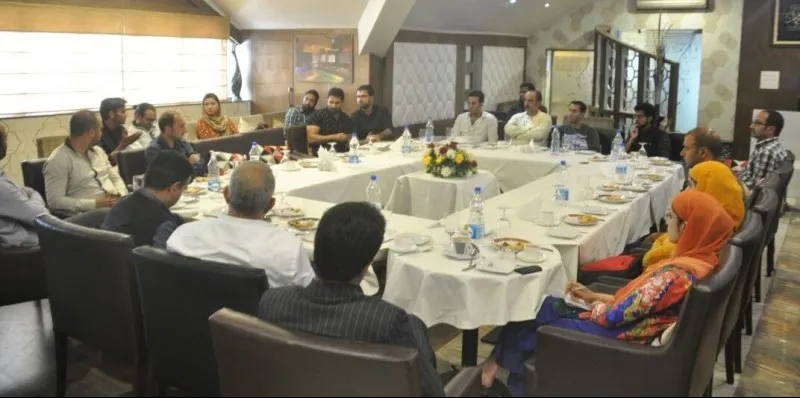How Kashmir’s Silk Route created an army of prospective entrepreneurs in just a year
Phamb is the latest entrant in Kashmir's entrepreneurship landscape. Translating to 'unprocessed pashmina wool', Phamb is an online portal that sells pashmina shawls made out of a rare wool ‑ Chiru. The differentiator with Phamb is that every product carries a geographical indication (GI) mark in a bid to protect buyers from fake pashmina. With nearly 200 products gone online, the organisation is aiming to engage 5,000 local artisans in the next three years.
Junaid Shahdar, Founder of Phamb, doesn't have an entrepreneurial background. He didn't establish the company single-handedly. He was mentored by The Silk Route Consulting Group, a startup that partners with the right minds and organisations to create a synergistic entrepreneurial ecosystem in the Valley that is 'sustainable, supportive, innovative and disruptive.' This is their story.

The roots of a daring dream

Born and brought up in Srinagar, Ejaz Ayoub completed his MBA in Finance from Kashmir University and took to the traditional route of working with MNCs. His stints in Wipro Technologies and Hewlett Packard gave him an opportunity to experience the cosmopolitan life of Mumbai and Delhi for the first time, ever. It was here that Ejaz noticed two things closely,
People equipped with a MBA do only two things ‑ either work with established corporates or start their own businesses. I had never witnessed this in Kashmir where the risk-taking appetite is low and most employable youth seek government jobs for the security and stability.
He further says,
The state has 7,00,000 educated unemployed youth. What makes the situation scary is that traditional employment is created by the government and as high as 3,500 per lakh population are employed in public sector. The private sector is nearly non-existent.

The trigger, however, was an event called Startup Saturdays, which Ejaz believes has a great business model. He says, "It usually happens across major cities where they conduct workshops by bringing established entrepreneurs to handhold the budding ones, creating a supportive ecosystem." The idea resonated with Ejaz who wanted to create a similar space in Kashmir. He came back and joined hands with his friend, Sameer Gojwari, a MBA graduate from Islamic University of Science and Technology (IUST).
In May 2015, the duo officially started The Silk Route Consulting Group. On the name, Ejaz says,
If you go back in to history, it was the famed Silk Route that gave Kashmiris job opportunities and raw materials. There is an emotional connect, people resonate with even today.
How is The Silk Route Consulting Group changing Kashmir’s economy?
A disheartened Ejaz says,
A recent World Bank Survey declared Kashmir at number 29 on the 'ease of doing business' indicator. This shows the problems the state is battling with. There is a dire need for an incubation centre where the youth can fearlessly toy with their ideas and receive full support.
He further says, "The Jammu and Kashmir Entrepreneurial Development Institute (JKEDI) doesn't have an incubator, and doesn't train people. It just understands the viability of a business plan and fund it. But there's so much more than finance." This is what The Silk Route Consulting Group is all about.
The organisation brings together experts in varied fields ‑ business planning and strategy, digital presence, entrepreneurship laws and regulations, patents and copyrights to name a few. These experts engage with budding entrepreneurs, hand-holding them through all phases until their businesses are finally launched. In just a year, three businesses have already started and one will see the light of the day, next week. These are ‑ Phamb, an online portal selling authentic, GI tagged pashmina shawls; Panun Shop ‑ another online startup that's putting the art and craft of Kashmir on the global map; and Next Care that acts as an offline and online pharmacy and provides home-based care management services.

Another interesting aspect of Silk Route is that it has started discussions around the current policies and how they can be bettered to establish a smoother entrepreneurial ecosystem. For instance, in a recent round-table conference around 'Manufacturing sector of J&K vis-a-vis New Industrial Policy', Silk Route brought entrepreneurs, business consultants, and government officials to discuss on how the broad-based policy will hamper the emerging entrepreneurial scenario and made recommendations which are being looked in to. Ejaz says, “We are engaging with the government continually to gain their confidence so that together, we can establish a vibrant scene in Kashmir.”
Deterrents to entrepreneurship in Kashmir
Despite all efforts, there are few strong deterrents which Ejaz feels will take time to erase –
- Conflict – “For any business to thrive, you need peace which Kashmir lacks. This is the main reason why people don’t invest here.”
- Geography – “At the moment, there’s only the Jawahar tunnel that connects us to the rest of the world. So, unlike an entrepreneur who starts out in Delhi and thinks of expansion from the onset, a Kashmiri entrepreneur is restricted to the Valley only. How will we transport what we produce?”
- Lack of skilled labour – “six percent of the population is employed as labourers and a majority of them come from outside Kashmir. This is a testimony that our education system is extremely theoretical, which is why we aren’t skilled enough – detrimental to our growth.”
- Lack of an enabling government – “There is neither an equity concept not mentoring at every stage by the government. It takes at least a year to start the smallest business in Kashmir and corruption plays a huge role here.”
- Less appetite for risk-taking ability – “In the history of Kashmir, one has never celebrated failure. The lack of social support systems proves a barrier for entrepreneurs to dream big.”
Impact of Silk Route and way forward
In just a year, Silk Route has conducted over 25 workshops for diverse industries ‑ tourism, food and beverages, fashion, textile to name a few. The company has mentored 250 prospective business minds in the age group 18‑25 years. With three businesses already been launched, there are at least 20 "in various stages of development". For a duo who started out with no experience, in a conflict zone and completely bootstrapped, it’s a feat. And no, they aren’t going to stop. Over the next two years, Silk Route is primarily going to focus on three things –
- Infrastructure – “We mentored Thinkpod co-working café, which is slated to launch next week and will be the first of-its-kind in Kashmir. The idea is to create similar spaces across the state, which will automatically make the environment more enabling.”
- Addressing policy gaps – “We are working with the government to refine existing policies and create value-adds that make the entire process of starting a business, smoother.”
- Equity – “We are creating a pool of non-resident Kashmiris who have settled abroad or are in high positions; and the idea is to utilise them for mentorship as well create a small equity for entrepreneurs.”
As Ejaz says in another article,
Seven-billion world population is mammoth enough to provide business to all of us in Kashmir. Even if every household of Kashmir starts its own export house, I am sure that every player will get its profitable pie.
And that’s what Silk Route is aiming to do; create enough businesses for Kashmir’s economy and people to flourish.
Read More:
The call of home made this US-returned entrepreneur revive Kashmir’s apple industry
How this software company from Kashmir became one of the fastest growing private companies in the US
How this 27-year-old artist is rolling the Kashmir canvas across the world







